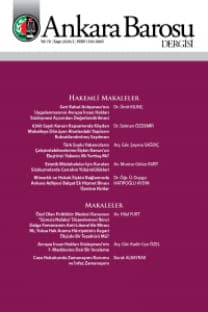Anayasa Mahkemesi’ne Bireysel Başvuruda Avrupa İnsan Hakları Sözleşmesi’nin Yorumu
Avrupa İnsan Hakları Sözleşmesi, adil yargılanma hakkı, sınırlama sebepleri, daraltıcı yorum, anayasal hakların kapsamı.
Interpretation of the Eur opean Convention on Hum an Rights within the conte xt of Individual Applications to the Constitutional Court
European Convention on Human Rights, right to a fair trial, grounds for restriction, restrictive interpretation, scope of constitutional rights.,
- ISSN: 1300-9885
- Yayın Aralığı: 4
- Başlangıç: 1942
- Yayıncı: Ankara Barosu Başkanlığı
Avrupa Birliği’ndeki Türk Vatandaşları ve Aile Birleşimi
Yrd. Doç. Dr. İlke , Narin GÖÇMEN , TEZCAN
Milletlerarası Deniz Kirliliği Sorumluluk ve Tazminat Rejimi İçinde Türkiye’nin Yeri
Kiralanan Taşınmaz Üzerinde Sonradan Ayni Hak Kurulması ve Buna Bağlanan Hukuki Sonuçlar (TBK M.311)
Ticari İşletme Devirlerinin Muvazaa Nedeniyle İptali (İİK.m. 280/III)
Anayasa Mahkemesi’ne Bireysel Başvuruda Avrupa İnsan Hakları Sözleşmesi’nin Yorumu
Çatışan İki Değer: Haber Verme Hakkı ve Kişilik Hakkı
Üçüncü Kişinin Kira Sözleşmesinin Kurulmasından Sonra Kiralananda Üstün Hak Sahibi Olması
